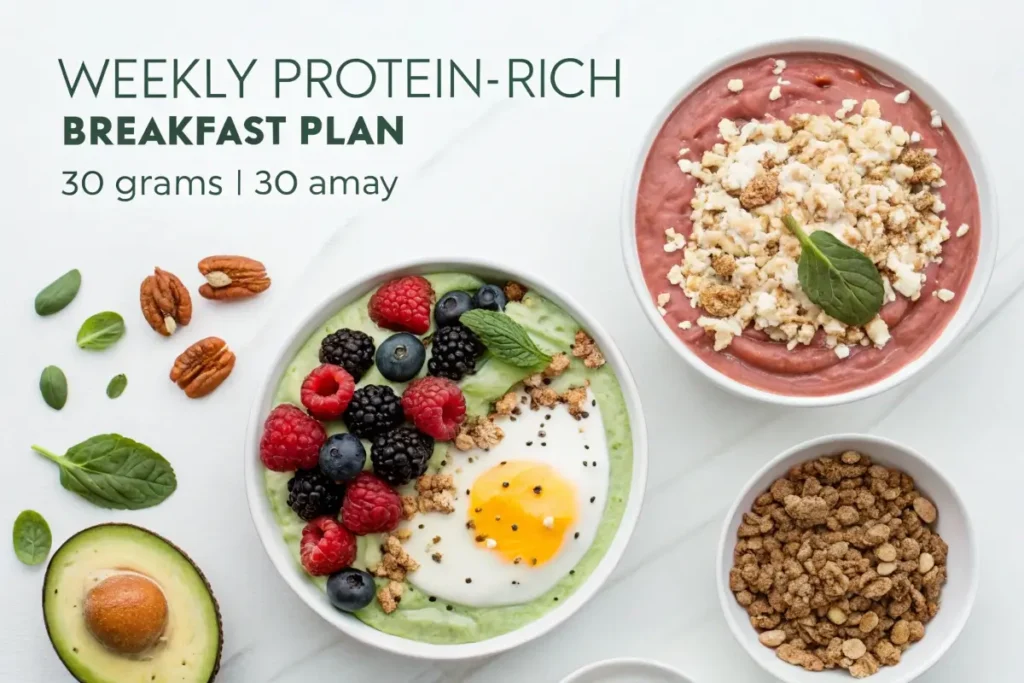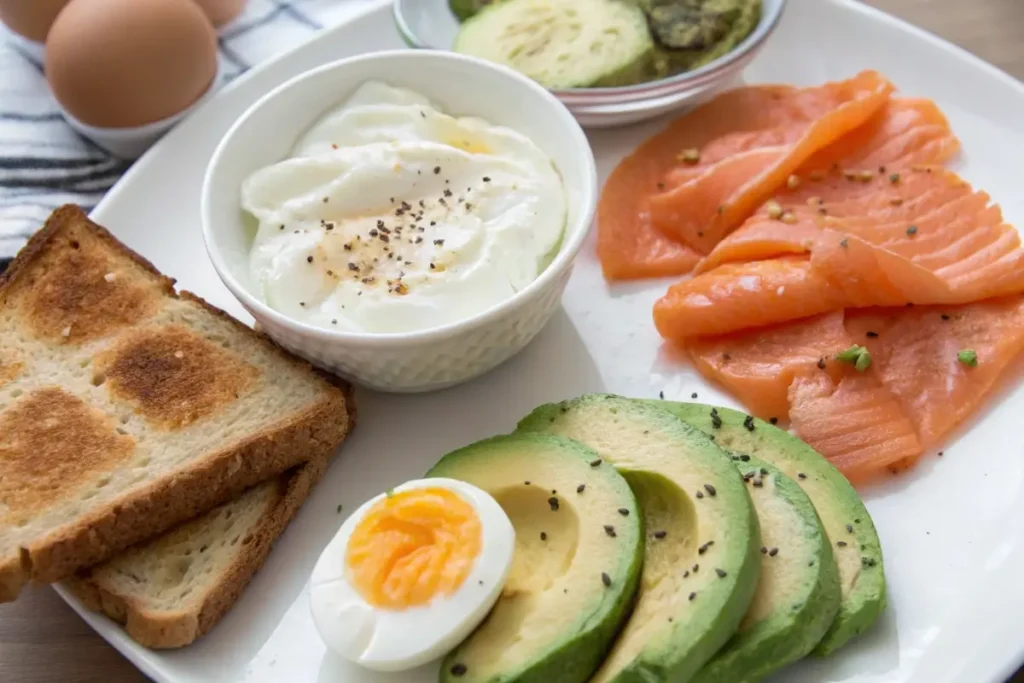Starting your day with a high-protein breakfast can make a significant difference in how you feel and perform throughout the day. But what is 30 grams of protein for breakfast and how can you achieve it? This article explores various ways to create a protein-packed breakfast that delivers 30 grams of protein, provides recipe ideas, and explains the health benefits of incorporating more protein into your morning routine.
Why You Need Protein for Breakfast
what is 30 grams of protein for breakfast Protein is one of the essential macronutrients our bodies need for growth, repair, and overall function. Starting your morning with a protein-rich meal can help you feel full for longer, balance your blood sugar levels, and boost your metabolism. Consuming 30 grams of protein for breakfast sets the tone for the day, providing energy and keeping cravings at bay.
According to a Harvard Health study, protein helps repair and build muscles, enhances hormone production, and supports immune system function. Incorporating more protein in the morning helps maintain muscle mass and keeps you energized throughout the day.
In the following segment, we’ll explore how you can achieve 30 grams of protein for breakfast and provide you with numerous food options to ensure you meet your protein goals.
How to Get 30 Grams of Protein for Breakfast
Achieving 30 grams of protein for breakfast may seem like a challenge, but there are plenty of food combinations that make it simple. Here’s how you can do it effectively:
1. Eggs and Cottage Cheese
Eggs and cottage cheese are great sources of high-quality protein.
- 3 large eggs: 18 grams of protein
- 1/2 cup cottage cheese: 14 grams of protein
Total: 32 grams of protein
This combination is easy to prepare and gives you over 30 grams of protein right away. Adding some leafy greens or sautéed vegetables can make this meal more nutritious.
2. Greek Yogurt Smoothie
A smoothie made with Greek yogurt, protein powder, and fruits is not only tasty but also protein-rich.
- 1 cup Greek yogurt: 20 grams of protein
- 1/2 scoop protein powder: 10 grams of protein
- 1/2 cup berries: 1 gram of protein
Total: 31 grams of protein
This smoothie provides the benefits of protein along with fiber from the berries, making it a well-balanced breakfast option.
3. High-Protein Pancakes

Protein pancakes are a delicious and filling way to achieve 30 grams of protein for breakfast.
- 1 scoop protein powder: 20 grams of protein
- 1/4 cup rolled oats: 3 grams of protein
- 2 large eggs: 12 grams of protein
Total: 35 grams of protein
These pancakes are easy to prepare and provide a balanced combination of protein, carbs, and fats to help kickstart your day.
High-Protein Breakfast Ideas: what is 30 grams of protein for breakfast
1. Tofu Scramble with Vegetables
Tofu is an excellent plant-based protein source, making it perfect for a vegan-friendly breakfast.
- 1/2 block firm tofu: 20 grams of protein
- 1/2 cup spinach: 2 grams of protein
- 1/4 cup nutritional yeast: 8 grams of protein
Total: 30 grams of protein
This tofu scramble is not only protein-packed but also provides essential vitamins and minerals from the vegetables.
2. Quinoa Breakfast Bowl
Quinoa is a versatile grain that’s high in protein and can be used to create a hearty breakfast bowl.
- 1 cup cooked quinoa: 8 grams of protein
- 1/2 cup Greek yogurt: 10 grams of protein
- 2 tablespoons chopped nuts: 6 grams of protein
- 1 tablespoon chia seeds: 3 grams of protein
Total: 27 grams of protein
Adding some berries or sliced banana to this breakfast bowl will help you reach the 30-gram protein target.
3. Cottage Cheese and Nut Butter Toast
Cottage cheese paired with whole-grain toast and nut butter is a protein-rich breakfast.
- 1/2 cup cottage cheese: 14 grams of protein
- 2 tablespoons almond butter: 7 grams of protein
- 1 slice whole-grain toast: 5 grams of protein
Total: 26 grams of protein
Adding a few slices of banana can further enhance the flavor and help you meet your protein needs.
Benefits of Consuming 30 Grams of Protein for Breakfast
1. Improved Satiety
Protein is known for its ability to keep you full for longer. Consuming 30 grams of protein for breakfast helps reduce hunger throughout the morning and prevents unhealthy snacking. A study from the American Journal of Clinical Nutrition suggests that a high-protein breakfast can significantly improve satiety compared to a high-carbohydrate breakfast.
2. Muscle Maintenance and Growth
Protein is essential for maintaining and building muscle mass. Including 30 grams of protein for breakfast ensures that your muscles receive the amino acids they need for repair and growth, especially if you are active or trying to build muscle.
3. Boosted Metabolism
A high-protein breakfast can increase thermogenesis, which is the process by which the body burns calories to digest food. Accordingly, starting the day with 30 grams of protein can help enhance your metabolism, contributing to weight management.
4. Balanced Blood Sugar Levels: what is 30 grams of protein for breakfast
Here is your revised paragraph with additional transition words:
Including 30 grams of protein for breakfast can help balance blood sugar levels, especially when paired with healthy fats and fiber. Therefore, this combination helps prevent energy crashes and sugar cravings throughout the day. Furthermore, when blood sugar levels remain steady, you are less likely to overeat later on.
5. Enhanced Mental Clarity: what is 30 grams of protein for breakfast
Protein plays a significant role in brain function. The amino acids in protein help produce neurotransmitters, which are responsible for mood and cognitive functions. Consuming 30 grams of protein for breakfast helps you stay focused, attentive, and productive throughout the morning.
Protein-Rich Breakfast Meal Plan for a Week to Get 30 Grams of Protein

Planning your high-protein breakfast ahead can help ensure that you meet your daily protein needs effortlessly. Here is a 7-day high-protein breakfast meal plan that provides 30 grams of protein for breakfast each morning.
Day 1: Greek Yogurt Parfait for a Protein-Packed Morning
- 1 cup Greek yogurt: 20 grams of protein
- 1/4 cup granola: 4 grams of protein
- 2 tablespoons chia seeds: 4 grams of protein
- 1/2 cup berries: 2 grams of protein
Total: 30 grams of protein
Day 2: Scrambled Eggs and Turkey Sausage for a High-Protein Start
- 3 large eggs: 18 grams of protein
- 2 turkey sausage links: 12 grams of protein
Total: 30 grams of protein
Day 3: Protein Smoothie to Get 30 Grams of Protein for Breakfast
- 1 scoop protein powder: 20 grams of protein
- 1 cup almond milk: 1 gram of protein
- 1/2 cup Greek yogurt: 10 grams of protein
Total: 31 grams of protein
Day 4: Quinoa Breakfast Bowl for a Balanced Protein Breakfast
- 1 cup cooked quinoa: 8 grams of protein
- 1/2 cup Greek yogurt: 10 grams of protein
- 2 tablespoons chopped almonds: 6 grams of protein
- 1 tablespoon chia seeds: 3 grams of protein
Total: 27 grams of protein
Day 5: Cottage Cheese and Smoked Salmon for a Protein-Rich Breakfast
- 1 cup cottage cheese: 28 grams of protein
- 2 oz smoked salmon: 12 grams of protein
Total: 40 grams of protein
Day 6: High-Protein Pancakes for an Energizing Breakfast
- 1 scoop protein powder: 20 grams of protein
- 1/4 cup rolled oats: 3 grams of protein
- 2 large eggs: 12 grams of protein
Total: 35 grams of protein
Day 7: Tofu Scramble for a Plant-Based 30-Gram Protein Breakfast
- 1/2 block firm tofu: 20 grams of protein
- 1/2 cup spinach: 2 grams of protein
- 1/4 cup nutritional yeast: 8 grams of protein
Total: 30 grams of protein
Common Breakfast Foods That Provide Protein: what is 30 grams of protein for breakfast

1. Eggs
Eggs are one of the most popular breakfast options due to their high protein content and versatility. Each egg contains about 6 grams of protein. Combining three eggs with vegetables or toast is a simple way to get 18 grams of protein.
2. Greek Yogurt
Greek yogurt is thicker and contains more protein than regular yogurt. A cup of Greek yogurt provides 15-20 grams of protein. You can top it with berries and seeds for added nutrients and taste.
3. Oats and Protein Powder
Adding protein powder to oats is a great way to boost their protein content. A typical serving of oats provides 5 grams of protein, and adding a scoop of protein powder can increase it by 20 grams.
4. Cottage Cheese
Cottage cheese is a great source of protein that can be enjoyed on its own or combined with other foods like nuts, fruits, or toast. Half a cup of cottage cheese contains approximately 14 grams of protein.
5. Tofu
Tofu is an excellent plant-based protein that can be used in scrambles, smoothies, or breakfast bowls. Half a block of firm tofu contains around 20 grams of protein, making it ideal for a vegan or vegetarian breakfast.
6. Nut Butters
Nut butters, such as almond or peanut butter, provide a decent amount of protein along with healthy fats. Two tablespoons of almond butter contain about 7 grams of protein. Pairing nut butter with whole-grain toast or fruit can help boost your protein intake.
7. Smoked Salmon
Smoked salmon is not only delicious but also a great source of protein and omega-3 fatty acids. A 3-ounce serving of smoked salmon provides around 15 grams of protein. Adding smoked salmon to a bagel with cream cheese or scrambled eggs is an excellent way to increase your protein intake.
Step-by-Step Recipe: High-Protein meal Omelette

A high-protein omelette is a great way to start the day with 30 grams of protein.
Ingredients
- 3 large eggs: 18 grams of protein
- 1/4 cup shredded cheddar cheese: 7 grams of protein
- 1/2 cup cooked spinach: 2 grams of protein
- 1/4 cup diced bell peppers: 1 gram of protein
- 1/4 cup black beans: 3 grams of protein
Instructions
- Crack the eggs into a bowl and whisk them thoroughly until smooth.
- Heat a non-stick skillet over medium heat and lightly grease it with cooking spray or olive oil.
- Pour the eggs into the skillet, allowing them to spread out evenly.
- Once the edges start to cook, add the spinach, bell peppers, and black beans evenly across the omelette.
- Sprinkle the shredded cheese on top and let the omelette cook for another 2-3 minutes.
- Carefully fold the omelette in half and cook until fully set, about 1-2 more minutes.
- Serve hot, and enjoy a protein-packed start to your day.
Nutritional Information (Per 100g)
| Nutrient | Amount |
|---|---|
| Protein | 12g |
| Calories | 150 kcal |
| Fat | 10g |
| Carbohydrates | 3g |
| Fiber | 1g |
FAQs: what is 30 grams of protein for breakfast
What Is 30 Grams of Protein meal for Breakfast?
30 grams of protein for breakfast can be achieved through different food combinations like eggs and cottage cheese or a Greek yogurt smoothie. This amount helps keep you full and provides sufficient energy for the morning.
How Can I Get 30 Grams of Protein for Breakfast?
You can get 30 grams of protein for breakfast by including foods like Greek yogurt, protein powder, eggs, cottage cheese, or tofu. Combining different protein-rich ingredients ensures you meet your daily needs.
What Does 30 Grams of Protein Look Like for Breakfast?
30 grams of protein for breakfast can look like 3 large eggs paired with 1/2 cup of cottage cheese or a smoothie made with Greek yogurt and protein powder.
Why Is Protein Important for Breakfast?
Protein helps stabilize blood sugar levels, increases satiety, and supports muscle health. Including 30 grams of protein for breakfast can help you stay full longer and maintain energy throughout the day.
Can I Get 30 Grams of Protein from a Plant-Based Breakfast?
Yes, it’s possible to get 30 grams of protein from a plant-based breakfast by combining foods like tofu, chickpea flour, tempeh, nuts, seeds, and plant-based protein powders.
Conclusion: what is 30 grams of protein for breakfast
In conclusion, understanding what is 30 grams of protein for brekky and how to achieve it can lead to numerous health benefits. Consuming a high-protein breakfast helps maintain satiety, supports muscle maintenance, and boosts metabolism. By combining protein-rich foods like eggs, Greek yogurt, cottage cheese, tofu, and protein powder, you can create easy and delicious breakfasts that keep you full and energized throughout the morning. Make tomorrow’s breakfast a protein-packed one!
